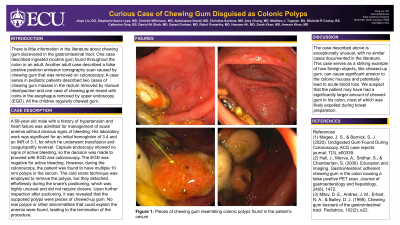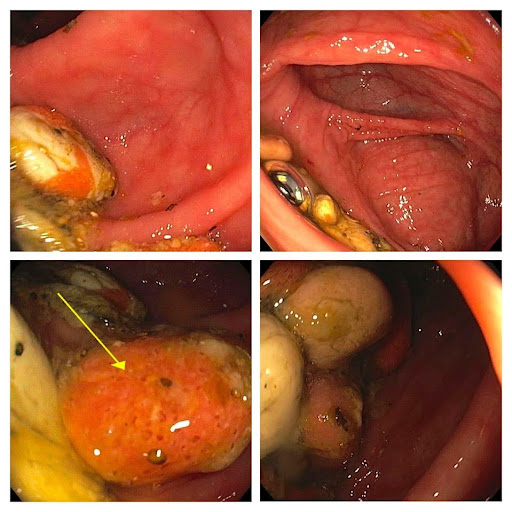Sunday Poster Session
Category: Colon
P0343 - Curious Case of Chewing Gum Disguised as Colonic Polyps
Sunday, October 27, 2024
3:30 PM - 7:00 PM ET
Location: Exhibit Hall E

Has Audio
- JL
Jinye Liu, DO
East Carolina University Medical Center
Greenville, NC
Presenting Author(s)
Jinye Liu, DO1, Stephanie Ibarra Lepe, MD1, Christin Wilkinson, MD2, Abdulazeez Swaiti, MD2, Christina Santana, MD1, Amy Chang, MD1, Matthew Tugman, BA3, Michelle Cooley, BS3, Catherine Gray, BS3, Saeed Graham, MD2, Rahul Pamarthy, MD2, Hassam Ali, MD2, Zarak Khan, MD4, M Danial Ali Shah, MD5, Anwaar Khan, MD1
1East Carolina University Medical Center, Greenville, NC; 2East Carolina University, Greenville, NC; 3East Carolina University Brody School of Medicine, Greenville, NC; 4East Carolina Gastroenterology, Greenville, NC; 5King Edward Medical University, Lahore, Punjab, Pakistan
Introduction: There is little information in the literature about chewing gum discovered in the gastrointestinal tract. One case described ingested nicotine gum found throughout the colon in an adult. Another adult case described a false positive positron emission tomography scan caused by chewing gum that was removed on colonoscopy. A case series in pediatric patients described two cases of chewing gum masses in the rectum removed by manual disimpaction and one case of chewing gum mixed with coins in the esophagus removed by upper endoscopy (EGD). All the children regularly chewed gum.
Case Description/Methods: A 68-year-old male with a history of hypertension and heart failure was admitted for management of acute anemia without obvious signs of bleeding. His laboratory work was significant for an initial hemoglobin of 3.4 and an INR of 3.1, for which he underwent transfusion and coagulopathy reversal. Capsule endoscopy showed no signs of active bleeding, so the decision was made to proceed with EGD and colonoscopy. The EGD was negative for active bleeding. However, during the colonoscopy, the patient was found to have multiple 10 mm polyps in the cecum. The cold snare technique was employed to remove the polyps, but they detached effortlessly during the snare's positioning, which was highly unusual and did not require closure. Upon further inspection after suctioning, it was revealed that the supposed polyps were pieces of chewed-up gum. No real polyps or other abnormalities that could explain the anemia were found, leading to the termination of the procedure.
Discussion: The case described above is exceptionally unusual, with no similar cases documented in the literature. This case serves as a striking example of how foreign objects, like chewed-up gum, can cause significant erosion to the colonic mucosa and potentially lead to acute blood loss. We suspect that the patient may have had a significantly larger amount of chewed-gum in his colon, most of which was likely expelled during bowel preparation.

Disclosures:
Jinye Liu, DO1, Stephanie Ibarra Lepe, MD1, Christin Wilkinson, MD2, Abdulazeez Swaiti, MD2, Christina Santana, MD1, Amy Chang, MD1, Matthew Tugman, BA3, Michelle Cooley, BS3, Catherine Gray, BS3, Saeed Graham, MD2, Rahul Pamarthy, MD2, Hassam Ali, MD2, Zarak Khan, MD4, M Danial Ali Shah, MD5, Anwaar Khan, MD1. P0343 - Curious Case of Chewing Gum Disguised as Colonic Polyps, ACG 2024 Annual Scientific Meeting Abstracts. Philadelphia, PA: American College of Gastroenterology.
1East Carolina University Medical Center, Greenville, NC; 2East Carolina University, Greenville, NC; 3East Carolina University Brody School of Medicine, Greenville, NC; 4East Carolina Gastroenterology, Greenville, NC; 5King Edward Medical University, Lahore, Punjab, Pakistan
Introduction: There is little information in the literature about chewing gum discovered in the gastrointestinal tract. One case described ingested nicotine gum found throughout the colon in an adult. Another adult case described a false positive positron emission tomography scan caused by chewing gum that was removed on colonoscopy. A case series in pediatric patients described two cases of chewing gum masses in the rectum removed by manual disimpaction and one case of chewing gum mixed with coins in the esophagus removed by upper endoscopy (EGD). All the children regularly chewed gum.
Case Description/Methods: A 68-year-old male with a history of hypertension and heart failure was admitted for management of acute anemia without obvious signs of bleeding. His laboratory work was significant for an initial hemoglobin of 3.4 and an INR of 3.1, for which he underwent transfusion and coagulopathy reversal. Capsule endoscopy showed no signs of active bleeding, so the decision was made to proceed with EGD and colonoscopy. The EGD was negative for active bleeding. However, during the colonoscopy, the patient was found to have multiple 10 mm polyps in the cecum. The cold snare technique was employed to remove the polyps, but they detached effortlessly during the snare's positioning, which was highly unusual and did not require closure. Upon further inspection after suctioning, it was revealed that the supposed polyps were pieces of chewed-up gum. No real polyps or other abnormalities that could explain the anemia were found, leading to the termination of the procedure.
Discussion: The case described above is exceptionally unusual, with no similar cases documented in the literature. This case serves as a striking example of how foreign objects, like chewed-up gum, can cause significant erosion to the colonic mucosa and potentially lead to acute blood loss. We suspect that the patient may have had a significantly larger amount of chewed-gum in his colon, most of which was likely expelled during bowel preparation.

Figure: Figure 1: Pieces of chewing gum resembling colonic polyps found in the patient’s cecum
Disclosures:
Jinye Liu indicated no relevant financial relationships.
Stephanie Ibarra Lepe indicated no relevant financial relationships.
Christin Wilkinson indicated no relevant financial relationships.
Abdulazeez Swaiti indicated no relevant financial relationships.
Christina Santana indicated no relevant financial relationships.
Amy Chang indicated no relevant financial relationships.
Matthew Tugman indicated no relevant financial relationships.
Michelle Cooley indicated no relevant financial relationships.
Catherine Gray indicated no relevant financial relationships.
Saeed Graham indicated no relevant financial relationships.
Rahul Pamarthy indicated no relevant financial relationships.
Hassam Ali indicated no relevant financial relationships.
Zarak Khan indicated no relevant financial relationships.
M Danial Ali Shah indicated no relevant financial relationships.
Anwaar Khan indicated no relevant financial relationships.
Jinye Liu, DO1, Stephanie Ibarra Lepe, MD1, Christin Wilkinson, MD2, Abdulazeez Swaiti, MD2, Christina Santana, MD1, Amy Chang, MD1, Matthew Tugman, BA3, Michelle Cooley, BS3, Catherine Gray, BS3, Saeed Graham, MD2, Rahul Pamarthy, MD2, Hassam Ali, MD2, Zarak Khan, MD4, M Danial Ali Shah, MD5, Anwaar Khan, MD1. P0343 - Curious Case of Chewing Gum Disguised as Colonic Polyps, ACG 2024 Annual Scientific Meeting Abstracts. Philadelphia, PA: American College of Gastroenterology.
